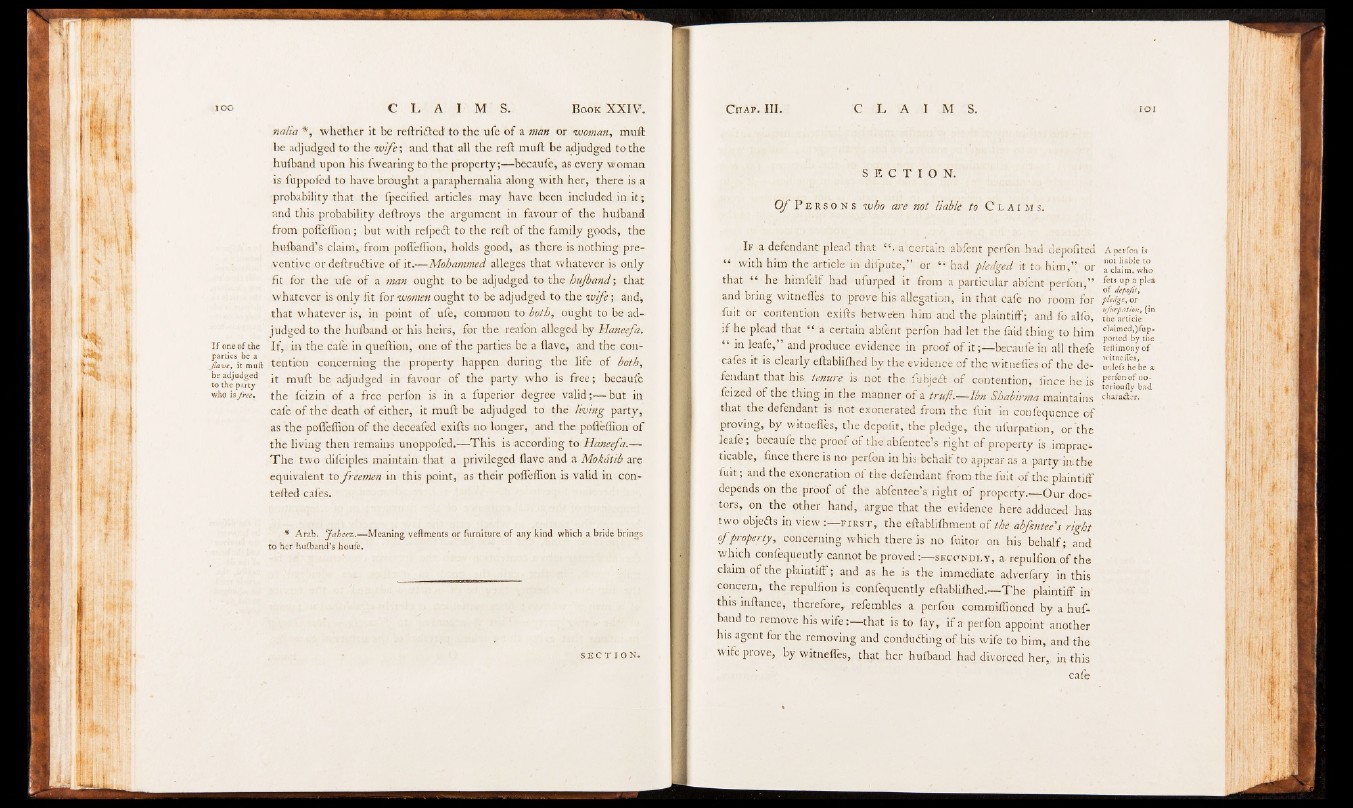
I f one o f the
parties be a
flame, it mu ft
be adjudged
to the party
who is free*
nalia * , whether it be re {trifled' to the ufe of a man or woman, muft
be adjudged to the w ife; and that all the reft muft be adjudged to the
hu{band upon his fwearing to the property;— becaufe, as every woman
is fuppofed to have brought a paraphernalia along with her, there is a
probability that the {pecified articles may have been included in it;
and this probability deftroys the argument in favour of the hufband
from pofieffion; but with refpeft to the reft of the family goods, the
hufband’ s claim, from poffeflion, holds good, as there is nothing preventive
or deftruftive of it.— Mohammed alleges that whatever is only
fit for the ufe of a man ought to be adjudged to the hujhand; that
whatever is only fit for women ought to be adjudged to the wife-, and*
that whatever is, in point of ufe, common to both, ought to be adjudged
to the hufband or his heirs, for the reafon alleged by Haneefa.
If, in the cafe in queftion, one of the parties be a flave, and the contention
concerning the property happen during the life of both,
it muft be adjudged in favour of the party who is free; becaufe
the feizin of a free perfon is in a fuperior degree valid;— but in
cafe of the death of either, it muft be adjudged to the living party,
as the poffeflion of the deceafed exifts no longer, and the pofieffion of
the living then remains unoppofed.— This is according to Haneefa.—
T h e two difciples. maintain that a privileged flave and a Mokdtib are
equivalent to freemen in this point, as their pofieffion is valid in con-
tefted- cafes.
* Arab. Jaheex.— Meaning veftments or furniture o f any kind which a bride brings
to her hufband’ s houfe.
S E C T I O N .
O f P e r s o n s who are not liable to C l a i m s .
I f .a defendant plead, that “ . a certain abfent perfon had depofited
“ with him the article in difpute,” or “ had pledged it to him,” or
that “ he himfelf had ufurped it from a particular abfent perfon,”
and bring witnefles to prove his allegation, in that cafe no room for
fuit or contention exifts betwe'en him and the plaintiff; and fo alfo,
if he plead that “ a certain abfent perfon had let the faid thing to him
“ in leafe, and produce evidence in proof of it ;— becaufe in all thefe
cafes it is clearly eftablifhed by the evidence of the witnefles of the defendant
that his tenure is not the fubjefl of contention, fince he is
feized of the thing in the manner of a trufl.— Ibn Shabirma maintains
that the defendant is not exonerated from the fuit in confequence of
proving, by witnefles, the depofit, the pledge, the ufurpation, or'the
leafe; becaufe the proof of the'abfentee’s right of property is impracticable,
fince there is no perfon in his behalf to appear as a party in-the
fuit; and the exoneration of the defendant from the fuit of the plaintiff
depends bn the proof of the abfentee’s, right of property.— Our doctors,
on the other hand, argue that the evidence here adduced has
two objefls in view :— f i r s t , the eftablifhment of the abfentee's right
ofproperty, concerning which there is no fuitor on his behalf; and
which confequently cannot be proved:— s e c o n d l y , a repulfion of the
claim of the plaintiff; and as he is the immediate adverfary in this
concern, the repulfion is confequently eftablifhed.— T h e plaintiff in'
this inftance, therefore, refembles a perfon commiflioned by a hufband
to remove his wife:— that is to fay, if a perfon appoint another
his agent for the removing and condufling of his wife to him, and the
wife prove, by witneffes, that her hufband had divorced her, in this
cafe
A perfon is
not liable to
a claim, who
lets up a pica
o f depofit,
pledge, or
ufurpation, (in
the article
claimed,) fup-
ported by the
teftimony o f
witnefles,
u nlefs he be a
perfon o f no-
tor iou fly bad
chara&er.